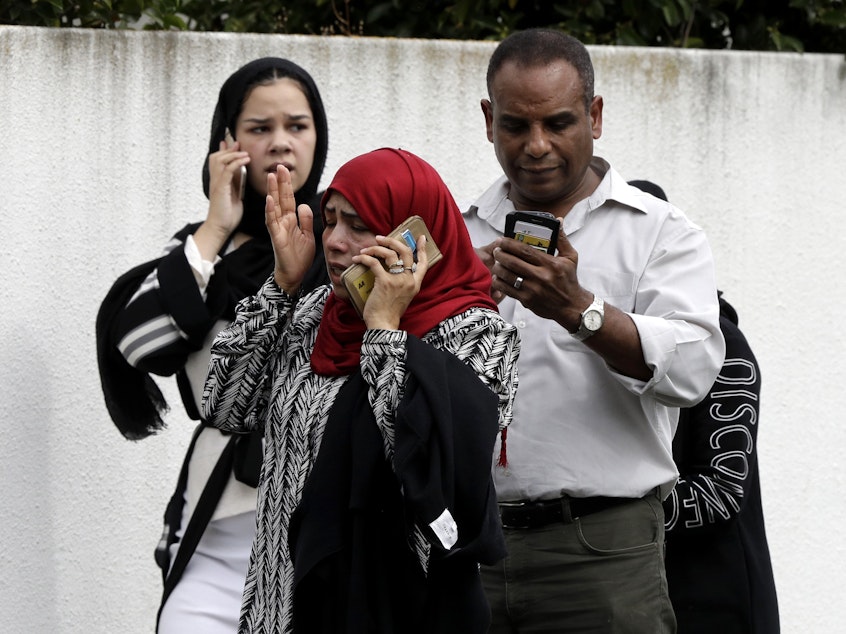'One Of New Zealand's Darkest Days': Shootings At Mosques Kill At Least 49

Afternoon prayers at two mosques in Christchurch, New Zealand, were ambushed by gunfire on Friday, leaving at least 49 people dead. Another 48 people were hospitalized.
New Zealand police have charged a 28-year-old man with murder, and have taken two others into custody. A fourth person turned out to have been arrested on an unrelated charge.
Most of those killed were worshiping at Al Noor Mosque when the gunman entered, killing at least 41 people. A second shooting at the Linwood Mosque, about 3 miles away, left seven people dead there. And a victim in one of the shootings died on the way to the hospital.
"I was really lucky," Nour Travis, who was on the scene at Al Noor told New Zealand radio station NewsTalk ZB. "I thought I'm gone as well."
Before the attack, a man who identified himself as a white man from Australia allegedly posted a 74-page, hate-filled screed online, and then live-streamed the killings on Facebook. He has not been publicly identified by officials.
The massacre rocked a small, peaceful nation where such events are extremely rare. Following the attack, New Zealand's national security level was changed from "low" to "high."
Sponsored
Prime Minister Jacinda Ardern described the shooting as "one of New Zealand's darkest days." She called the shootings a terrorist attack, one that appeared to have been well planned. With a grim expression, she said the country seems to have been targeted because of its welcoming and tolerance.
"We were not chosen for this act of violence because we condone racism, because we are an enclave for extremism," Ardern said during a news conference in Wellington. "We were chosen for the very fact that we are none of these things. Because we represent diversity, kindness, compassion, a home for those who share our values, refuge for those who need it. And those values, I can assure you, will not, and cannot, be shaken by this attack."
Prior to Friday's attack, the country's deadliest shooting occurred in 1990, when a man killed 13 people following a dispute with a neighbor.
Christchurch is New Zealand's second-largest city, with a population of about 375,000 people. "Our city has changed forever today," Mayor Lianne Dalziel said in a statement. "It is beyond belief that something like this should happen in our city and in New Zealand."
In his screed, the suspected gunman said he had been planning the attack for two years. He claimed to represent Europeans and whites in a battle against immigrants, people he repeatedly described as "invaders." He also referred to the right to bear arms as laid out in the Second Amendment of the U.S. Constitution, and claimed that attempts to take away guns in the U.S. will lead to a civil war.
Sponsored
A front page of New Zealand newspaper The Dominion Post reflected the sense of shock and grief: "End of innocence."
New Zealand's ambassador-designate to the U.S., Rosemary Banks, told NPR that authorities are "convinced this particular event is over."
"We are a very diverse society, we have over 200 ethnicities, 160 languages...we have been very welcoming to outsiders," Banks said Friday. "For these people who are victims in these mosques — they are refugees, they are people who are from our migrant communities who've chosen to live in New Zealand, thinking they would find a safe place where they could be free in their religion and their culture."
The White House released a statement condemning the attacks. "Our thoughts and prayers are with the victims and their families. We stand in solidarity with the people of New Zealand and their government against this vicious act of hate."
The alleged gunman reportedly streamed 17 minutes of the attack on Facebook. The social media platform removed the video and removed the suspect's accounts. The company says it is working directly with the New Zealand Police, the country's national police force, in its investigation. In a statement, according to The Associated Press, Facebook New Zealand spokeswoman Mia Garlick said that the company is "also removing any praise or support for the crime and the shooter or shooters as soon as we're aware."
Sponsored
Twitter and Google, which owns YouTube, say they're working to remove any video of the shootings from their sites, as well. Versions of the video reportedly persisted on the sites for hours after the shootings.
The suspect is expected to appear in Christchurch District Court on Saturday morning local time, according to New Zealand Police.
"You may have chosen us," Ardern said Friday, "but we utterly reject and condemn you."
This is a developing story. Some facts reported by the media may later turn out to be wrong. We will focus on reports from police officials and other authorities, credible news outlets and reporters who are at the scene. We will update as the situation develops. [Copyright 2019 NPR]
